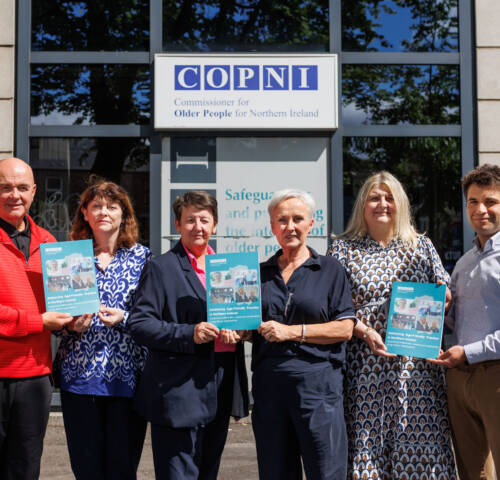In his statement to the Inquiry, the Commissioner also said that the mortality, morbidity, and sheer trauma experienced by older people during the Covid-19 pandemic must be avoided in the future.
During the pandemic, the Commissioner for Older People, Eddie Lynch, played a significant role as a vocal, independent advocate for the rights and interests of older people. The Commissioner is one of several core participants who has been called to give evidence in this module.
Speaking at the Inquiry, which is taking place in Northern Ireland from 30 April – 16 May, the Commissioner said older people paid a high price for the Government’s failures in its handling of the pandemic.
The Commissioner said: “The Government failed in its most basic of tasks to ensure the public would be as safe as possible from the impact of a pandemic and a high price was paid for that failure by older people and the professionals and families who cared for them.”
The Commissioner also said some of the early decisions taken in the pandemic put vulnerable older people at increased risk of contracting Covid-19 often to fatal effect and that despite the government seeking to reassure the public that it was acting to protect the most vulnerable, some of the decisions they made contradicted this.
Eddie Lynch told the Inquiry “It was very clear cut that the policy of discharging people without testing was a potentially disastrous one. I think it was reckless.”
By the time testing to all care home residents and staff came into effect, there had been a total of 269 registered deaths from Covid-19 in care homes.
The Commissioner also outlined issues and concerns with communications describing both a failure in communication as well as communication that was inconsistent and contradictory. The issue of ageism and age discrimination was also highlighted. Some of the other key points he stated in his evidence were:
- During the early stages of the pandemic care home-owners were not afforded a meaningful opportunity to assist the government by providing information and feedback that could be factored into the development of policy and guidance.
- Trust and confidence between stakeholders and government had been broken due to the Government’s failure to properly involve stakeholders in the development of guidance and to properly provide adequate explanation and open and consistent communications with the public.
- Government’s response in Northern Ireland in certain instances gave the appearance of reflecting ageist prejudices. In order to ‘protect the NHS’ discussions on how to manage such a high rate of very sick Covid-19 patients and how best to allocate ICU beds and ventilators gave rise to an ageist narrative in the public domain. Although an ethical group was established, the fact that the public were unaware of its existence, allowed a real fear to develop amongst older people and their families that age could be used as a criterion for making those decisions.
The Commissioner also highlighted how the pandemic brought to light the importance of age discrimination legislation being established in Northern Ireland, (as it is in England, Scotland and Wales) a call he has repeatedly made. Although he acknowledged it is a matter for the Inquiry to determine whether there is evidence of age discrimination in the Government’s response to the pandemic in Northern Ireland, it is clear that older people were disproportionately affected by Covid-19.
90% of COVID-19 deaths in the first wave of the pandemic were in people aged over 65 and around half of COVID-19 deaths in Northern Ireland occurred in a care home. The percentage of deaths would be even higher were those of 60 years and over (legal definition of an older person according to COPNI Act 2011) included.
The Commissioner’s evidence to the Inquiry stated: “Whilst the high numbers of older people who died at such an alarming rate in care homes remains shocking, it fails to adequately convey their experience. Frequently they died isolated from their loved ones. They are likely to have found what was happening to them, the loss of physical contact and the absence of familiar family, not only incomprehensible at times but extremely frightening. For some older people in care homes, the first wave happened in the end stage of their lives.
Baroness Hallett concluded the Commissioner’s Hearing by thanking the Commissioner: “Thank you Mr Lynch for all you did and tried to do, don’t give up, keep banging the drum.”
The Commissioner said he is eager for this Inquiry to conclude as soon as possible so that its recommendations can be reflected into future planning.




